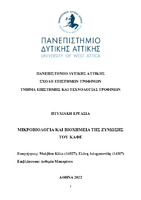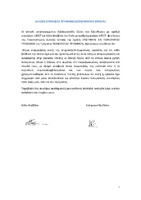| dc.contributor.advisor | Batrinou, Anthimia | |
| dc.contributor.author | Δεληγιαννίδη, Ελένη | |
| dc.contributor.author | Κόλα, Μαλβίνα | |
| dc.date.accessioned | 2022-10-03T08:12:05Z | |
| dc.date.available | 2022-10-03T08:12:05Z | |
| dc.date.issued | 2022-09-22 | |
| dc.identifier.uri | https://polynoe.lib.uniwa.gr/xmlui/handle/11400/2955 | |
| dc.identifier.uri | http://dx.doi.org/10.26265/polynoe-2795 | |
| dc.description.abstract | Η παραγωγή του καφέ, ο οποίος αποτελεί το δεύτερο πιο εμπορεύσιμο αγαθό μετά το πετρέλαιο, έχει μελετηθεί λεπτομερώς και χρήζει ενδιαφέροντος παγκοσμίως. Ο καρπός του καφέ ανήκει στο γένος Coffea και προέρχεται από 3 είδη: Coffea arabica, Coffea canephora και Coffea liberica με τα πρώτα 2 είδη να επικρατούν σε ποσοστό καλλιέργειας και παραγωγής. Καλλιεργείται κυρίως σε περιοχές του Ισημερινού και ακολουθεί έναν ετήσιο κύκλο ανάπτυξης και καρποφορίας. Οι ώριμοι καρποί υφίστανται ξηρή (dry process) ή υγρή (wet process) επεξεργασία για να γίνει εξαγωγή των κόκκων από τον περίβλημά τους. Οι διαφορετικοί τρόποι επεξεργασίας των κόκκων μετά τη συλλογή τους, επηρεάζει τα μεταβολικά μονοπάτια και τις αντιδράσεις που συμβαίνουν στον καφέ. Η ζύμωση είναι η σημαντικότερη μεταβολική διαδικασία του καρπού και σχετίζεται άμεσα με το τελικό αποτέλεσμα του προϊόντος του καφέ. Για αυτόν τον λόγο έχουν μελετηθεί εκτενώς οι συμμετέχοντες μικροοργανισμοί καθώς και οι μεταβολικές διαδικασίες που λαμβάνουν χώρα στην διαδικασία αυτή. Οι μικροοργανισμοί προκύπτουν φυσικά πάνω στον καρπό και στο εσωτερικό του και αυξάνονται σε αριθμό, μέχρι την ωρίμανση του καρπού. Η ζύμωση είναι σημαντική για την αποικοδόμηση και απομάκρυνση του εξωτερικού περιβλήματος του καρπού. Τέλος, το καβούρδισμα του καφέ είναι η θερμική επεξεργασία των ωμών κόκκων καφέ που έχουν απαλλαχθεί από το εξωτερικό τους περίβλημα και έχει ως αποτέλεσμα την αλλαγή των φυσικών, δομικών, χημικών και οργανοληπτικών ιδιοτήτων του καφέ ώστε να προκύψει το τελικό προϊόν του ροφήματος του καφέ. Κατά το καβούρδισμα πραγματοποιούνται ενδόθερμες και εξώθερμες αντιδράσεις, με κυριότερες αντιδράσεις την Maillard και την Strecker. Το καβούρδισμα αποτελεί σημαντικό βήμα στην παραγωγή του καφέ και το τελικό προϊόν είναι άμεσα συνδεδεμένο με τις συνθήκες κάτω από τις οποίες υπέστη επεξεργασία ο καρπός. | el |
| dc.format.extent | 73 | el |
| dc.language.iso | el | el |
| dc.publisher | Πανεπιστήμιο Δυτικής Αττικής | el |
| dc.rights | Αναφορά Δημιουργού - Μη Εμπορική Χρήση - Παρόμοια Διανομή 4.0 Διεθνές | * |
| dc.rights | Attribution-NonCommercial-NoDerivatives 4.0 Διεθνές | * |
| dc.rights.uri | http://creativecommons.org/licenses/by-nc-nd/4.0/ | * |
| dc.subject | Ζύμωση καφέ | el |
| dc.subject | Coffea arabica | el |
| dc.subject | Γένος Coffea | el |
| dc.subject | Coffea robusta | el |
| dc.subject | Καβούρδισμα | el |
| dc.subject | Αντίδραση Maillard | el |
| dc.title | Μικροβιολογία και βιοχημεία της ζύμωσης του καφέ | el |
| dc.title.alternative | Microbiology and biochemistry of coffee fermentation | el |
| dc.type | Πτυχιακή εργασία | el |
| dc.contributor.committee | Κυρανά, Βασιλική | |
| dc.contributor.committee | Στρατή, Ειρήνη | |
| dc.contributor.faculty | Σχολή Επιστημών Τροφίμων | el |
| dc.contributor.department | Τμήμα Επιστήμης και Τεχνολογίας Τροφίμων | el |
| dc.description.abstracttranslated | The production of coffee, which is the second most tradable commodity after oil, has been studied in detail and deserves worldwide attention. The coffee fruit belongs to the genus Coffea and comes from 3 species: Coffea arabica, Coffea canephora and Coffea liberica with the first 2 species prevailing in terms of cultivation and production. Coffee is cultivated mainly in areas around the Equator and follows an annual growth and fruiting cycle. Ripe fruits undergo a dry process or a wet process to extract the kernels from their casing. The different ways of processing the beans after they are collected, affects the metabolic pathways and reactions that occur in the coffee. Fermentation is the most important metabolic process of the fruit and is directly related to the final result of the coffee product. For this reason, the participating microorganisms as well as the metabolic processes that take place in this process have been extensively studied. Microorganisms occur naturally on the fruit and inside it and increase in number until the fruit ripens. Fermentation is important to break down and remove the outer skin of the fruit. Finally, coffee roasting is the heat treatment of the raw coffee beans that have been freed from their outer casing and results in the change of the physical, structural, chemical and organoleptic properties of the coffee to produce the final product of the coffee beverage. During roasting, endothermic and exothermic reactions take place, with the main reactions being Maillard and Strecker. Roasting is an important step in the production of coffee and the final product is directly linked to the conditions under which the fruit was processed. | el |



